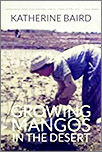Review | GROWING MANGOS IN THE DESERT by Katherine Baird (Mauritania)
Growing Mangos in the Desert: A Memoir of Life in a Mauritanian Village
by Katherine Baird (Mauritania 1984–86)
Apprentice House Press
2022
380 pages
$19.99 (paperback), $32.99 (hard cover), $6.49 (Kindle)
Reviewed by Lucinda Wingard (Nigeria 1966 – 68)
•

Katherine Baird
Among more than two dozen young volunteers trained for agricultural service in Mauritania in 1984, Katherine Baird was one of ten remaining by her second year. She had survived the rigors of wielding her short-handled hoe in blistering heat, had adapted to eating meals from a common bowl with her neighbors, and had successfully threaded through baffling local hierarchies.
Mauritania needed Peace Corps to help staff a fledgling initiative funded with foreign money: growing rice along a desolate part of the Senegal River. Baird brought no experience to help her fulfill this work, but her diligent note-taking and detailed records show she pitched into her assignment with a will.
“Keyti” was given a small compound, on a cliff overlooking the river without electricity or running water, next door to her host “parents.” She was regularly visited by unemployed teenagers and half-employed men. She wandered the village to forge friendships with the married women and she learned the three phases of making and drinking tea.
But whether male or female, friendships with a tubaak (white person) always began on unlevel ground. “For some time, I remained plagued by thoughts that others saw me as the promised manna that must be grabbed before others got it. I second guessed my impressions of others, as I couldn’t trust my instincts…. I realized that what was not said was harder to understand than what was. My very partial understanding of the world around me left me contending with it the way I imagine a two-year-old does.”
She hired the village’s school teacher, a man named Tall, one of a handful of literate villagers, to give her daily lessons in Pulaar. The relatively prosperous man clued her in to the area’s history as well as repeating current events he heard reported from Paris on his radio.
Looming over every chapter is the character of Mamadou Konaté, director of the single successful agricultural cooperative in Civé. She had been initially put off by his imperious manner and impeccable clothing but soon realized his leadership was key. Eventually Baird and he became a powerful team. She had the literacy and the status of being white. He had the political savvy and connections. Their projects began to attract funds from international NGOs. Release from grinding poverty and ill-health in Civé looked within reach. But wait, there’s always more…
As the villagers came to trust her, they had questions. “Americans visited the moon, truthfully?” They wanted to know what benefit sending Americans to the moon had been. Baird privately questioned the benefit of all the money and effort spent on sending herself to Civé, where babies died for lack of cheap remedies, where children had no schools, and where people starved because the rains failed.
As her ability in Pulaar expanded, Mamadou engaged her in deeper conversation. He surprised her by bringing up the subject of religion. Five times each day the entire village prayed, even rising from naps in the breathless 117-degree heat during Ramadan. She asked him why Allah would allow his people to suffer so. Mamadou’s response was full of phrases she could not follow, but his faith in Allah who “provides challenges” was clear.
Nevertheless, Mamadou had plans for relieving suffering. He wanted wells to be dug, he wanted work for the women so they could be more independent, and he wanted fruit trees. The potential for planting fruit trees inspired both of them. The process of acquiring funding, getting government sanction, arranging for the delivery of 1500 mango, guava, and banana saplings, and getting them safely planted in Civé was fraught and dramatic (material for a great movie I’d say).
Baird’s memoir continues past her tearful leave-taking in 1987. Over the next decades, she reports, Mauritanians and the Pulaar in Civé suffered political upheaval, violence, torture, and economic failure. She visited Civé in 1996 and 2012 to witness the changes. Mamadou Konaté’s genius had saved the cooperatives more than once. And to her relief, one single reminder of her presence had also survived: the shade-throwing, income-boosting grove of mangos.
Throughout her story, Baird displays essential PCV attributes—generosity, commitment, tolerance, and flexibility. But she acknowledges one additional component for success—the presence of Mamadou Konaté. The two had an improbable combination of energy, integrity, and leadership. Together, they built the foundation that sustained Civé through tragic times.
Is Baird’s memoir too long? Perhaps, but there’s not one phrase I would suggest deleting (other than a sprinkling of typos in this first edition). I’m sure any former volunteer serving anywhere would delight in the many scenes of training, of celebrations, of Peace Corps’ bungling bureaucracy, and of cross-cultural faux pas, some hilarious only in retrospect. Baird’s storytelling includes important commentary on the Peace Corps mission, Mauritanian history, international NGOs, and the work of “do-gooders” everywhere.
This book is more than a well written and touching memoir: it is excellent journalism and a significant historical resource. Ask your local library to add it to their collection.
•
Reviewer Lucinda Wingard (Nigeria 1966 – 68) tried her hand at all manner of classroom teaching since her first job at Gombe Teachers College, Gombe, Nigeria. Her students since then have included returning American soldiers from Viet Nam, adult Vietnamese refugees, teenagers in American public schools, first graders in an American School in Mexico, and incarcerated undocumented teenagers in the US. She has clerked at the Pierce County Library System, and she tried her hand at writing a novel that expressed some of her epiphanies while serving in Nigeria, The Turn-Around Bird. Lately she is Book Editor for the Friends of Nigeria newsletter.

This is an excellent review of a book I’ve just (today) finished reading. Baird’s GROWING MANGOS IN THE DESERT is a brilliant Peace Corps memoir, probably the best PC memoir I’ve ever read. Anyone who is considering writing their own PC memoir should get this one and read it carefully to see how it’s done.